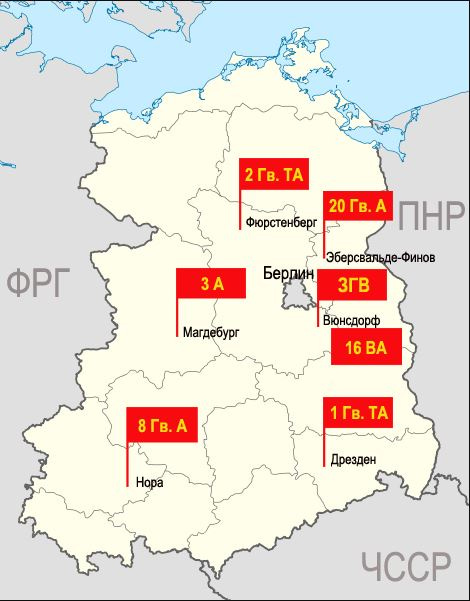Bolshevist Russian Military Occupation of Germany Restored
Russia's Military Bases in Germany, manned till 1994

The Hidden Russian Agenda: Germany and Ukraine Under Covert Occupation Threat
https://watchman.news/2025/02/russias-return-to-germany-only-fighting-nazis/
For decades, Russia has covertly maintained influence in Germany, long after the Soviet Union’s formal military withdrawal in 1994. Now, through its weaponized use of the term "Nazi", Russia is signaling a much broader geopolitical strategy—one that goes far beyond Ukraine and extends into the heart of Germany itself.
1. Russia’s Ongoing Occupation of Germany
The German Civil War period following World War I saw direct Bolshevik military intervention in Germany, with a Red Army composed of Polish and Russian forces actively fighting against German nationalist and monarchist elements. This army played a significant role in forcing the Kaiser’s abdication, laying the foundation for ongoing leftist revolutionary movements.
Soviet military forces officially left Germany in 1994, but Russia never truly abandoned its strategic foothold.
Putin, as a former KGB officer in East Germany (1985-1990), possesses deep expertise in Germany’s political, social, and intelligence networks.
Post-Cold War, Russia continued to exert control through:
Political alliances with former East German socialist factions (Die Linke, SPD elements).
Economic dependency strategies (Nord Stream energy projects).
Intelligence infiltration and influence operations, maintaining an invisible occupation.
2. The Weaponization of “Nazism” to Justify Occupation
Russia has long used the term “denazification” as a pretext for occupation and control.
The Soviets originally used this term to justify their military presence in East Germany (GDR).
Now, Putin has re-applied the “Nazi” label to Ukraine—using it as a legal and ideological justification for invasion.
The true target is not just Ukraine—but Germany itself.
By using the term "Nazi," Putin is laying legal and psychological groundwork for a possible military justification to attack and reoccupy Germany overtly.
3. Putin’s Larger Strategy: Rolling Back NATO and Reasserting Russian Control Over Germany
Putin's end goal is not just Ukraine, but a reversal of NATO expansion and a restoration of pre-1991 Soviet geopolitical control.
Germany is the central target because:
It remains Europe’s largest economy and NATO’s key European pillar.
It was formerly occupied by Russia, giving Putin a historical claim to its strategic positioning.
He understands Germany better than any other Western country, thanks to his KGB tenure there.
The propaganda usage of “Nazism” is not just rhetoric—it is a strategic move to create an international legal and ideological basis for action.
4. The House of Brunswick as the Ultimate Counter to Russian Expansion
Germany has lacked true historical legitimacy since the destruction of its monarchy in 1918, first by socialist revolutionaries, then by the Nazis, and finally by Soviet occupation.
The only true restoration of German sovereignty lies in the rightful, de jure restoration of the House of Brunswick, who continued officially arguing for true decentralized German state sovereignty from the pre-1866 annexations by Prussia. As continued officially in Parliament in the Deutsche Partei/Guelphic Party through the 1960s and in the House members who immigrated to America pursuant to a US treaty to immigrate that year and retain all their rightful estates and rights to the broader domains.
Recognizing the House of Brunswick would instantly dismantle Russia’s false historical claims and:
Provide a German government structure that predates Soviet control.
Eliminate the ability to use "Nazism" as a justification for intervention.
Resist any covert Russian influence inside Germany’s political landscape.
Revive the historical model of regional sovereignty that was long maintained under German and Austrian imperial protection prior to World War I, ensuring stability and confederated security in historically German-administered regions such as Ukraine and Poland.
Strengthen Poland and Ukraine’s sovereignty by anchoring them to historically static and protective structures, rather than leaving them vulnerable to shifting geopolitical pressures.
5. The Call to Action: How Germany, NATO, and the West Must Respond
Recognize Russia’s strategy for what it truly is: A long-term plan to justify a return to German soil under the pretext of "denazification."
Expose the true nature of Russia’s war on Ukraine: It is not about Nazism—it is about suppressing conservative, Christian, and monarchist resurgence.
Counter Russia’s propaganda by promoting Germany’s true historical legitimacy through the House of Brunswick.
Germany must reject Russian influence and prepare for a possible overt occupation attempt in the coming decade.
NATO and the West must reinforce Germany as the frontline against Russian expansionism, recognizing that Germany—not just Ukraine—is Putin’s ultimate target.
Conclusion: Russia’s Real War is Against Germany’s Sovereignty
The war in Ukraine is not just about Ukraine—it is about justifying a broader Russian expansion that could ultimately reach Germany itself. Putin understands Germany better than any other Western country and is laying the groundwork for a future occupation under the false pretense of fighting "Nazism." The only true counter to this existential threat is to restore Germany’s historical legitimacy under the House of Brunswick, severing Russia’s last claim to influence over German sovereignty.
The West must wake up to the real threat—not just in Ukraine, but in Germany itself—before it is too late.


